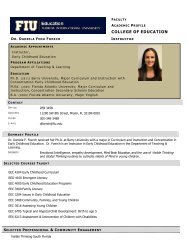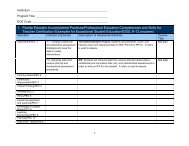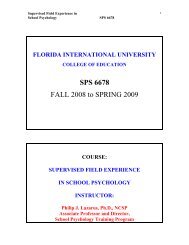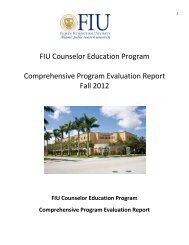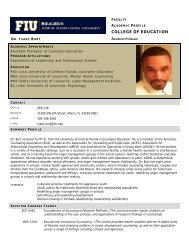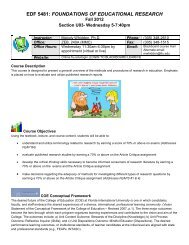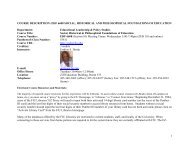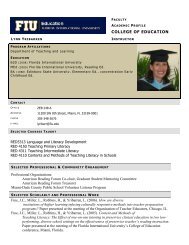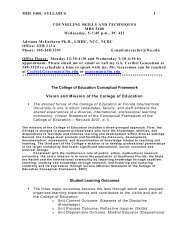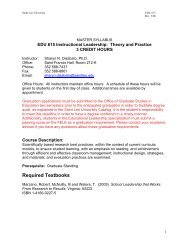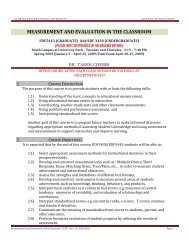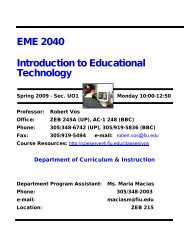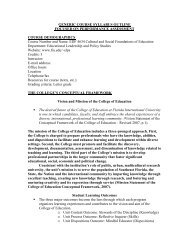2007 - College of Education - Florida International University
2007 - College of Education - Florida International University
2007 - College of Education - Florida International University
Create successful ePaper yourself
Turn your PDF publications into a flip-book with our unique Google optimized e-Paper software.
The Mistranslation <strong>of</strong> the ABCs:<br />
An American AIDS <strong>Education</strong> Campaign in Botswana<br />
Liana Casbarro and Jemlys Jäger<br />
<strong>Florida</strong> <strong>International</strong> <strong>University</strong>, USA<br />
Abstract: The majority <strong>of</strong> Botswana citizens have access to national HIV/AIDS<br />
education, but the messages ignore native cultural practices. The purpose <strong>of</strong> this<br />
paper is to critique the influence <strong>of</strong> American humanism and individualism on the<br />
ABC model <strong>of</strong> HIV/AIDS prevention used to stem the AIDS epidemic in<br />
Botswana.<br />
In 2005, the Joint United Nations Programme on AIDS (UNAIDS) estimated that 36.3<br />
million adults and children in the world are living with HIV. Adults 15 to 49 living in Sub-<br />
Saharan Africa make up 67% <strong>of</strong> the world’s HIV positive population. In one Sub-Saharan<br />
country, Botswana, 270,000 adults are estimated to be living with HIV (UNAIDS, 2006).<br />
The Botswana AIDS Impact Survey conducted by the National AIDS Coordinating<br />
Agency, Botswana government agency, found that 92% <strong>of</strong> men and 94% <strong>of</strong> women in urban<br />
areas knew that AIDS can be avoided. Even in rural areas, 84% <strong>of</strong> men and 85% <strong>of</strong> women had<br />
knowledge <strong>of</strong> how to avoid AIDS (Mogomotsi, 2004). These surveys indicate that the majority<br />
<strong>of</strong> Batswana, or Botswana citizens, have access to national HIV/AIDS education. Unfortunately,<br />
national education messages have ignored native health and sex education as well as norms <strong>of</strong><br />
sexual behavior (Ntseane & Preece, 2005).<br />
Government sponsored AIDS education has relied predominantly on the ABC (Abstain,<br />
Be Faithful, Condomise) campaign, to stem the AIDS epidemic in Botswana. The ideals <strong>of</strong><br />
sexual behavior that the ABC campaign promotes have been borrowed heavily from American<br />
programs and endorse American values. The purpose <strong>of</strong> this paper is to critique the influence <strong>of</strong><br />
American individualism and humanism, which are contrary to the norms <strong>of</strong> Botswana’s<br />
collectivist society, on the ABC model <strong>of</strong> HIV/AIDS prevention used throughout Sub-Saharan<br />
Africa.<br />
The ABC Campaign<br />
The first AIDS case in Botswana was reported in 1985. By 1987, AIDS had spread to<br />
enough <strong>of</strong> the population that Botswana’s government acknowledged AIDS as a potential health<br />
crisis and set up the National AIDS Control Program (Heald, 2002). Throughout the late 80s and<br />
90s, the World Health Organization, USAID, and various INGOs worked with Botswana’s<br />
Ministry <strong>of</strong> Health in setting up programs for HIV/AIDS surveillance and control. “In 1988, the<br />
first national AIDS prevention campaign used radio messages, car bumper stickers, and T-shirts<br />
to convey behavior modification messages” (Allen & Heald, 2004, p. 1144).<br />
The vigor <strong>of</strong> the government’s initial response died quickly as the messages failed to<br />
change behavior. Lack <strong>of</strong> awareness <strong>of</strong> the severity <strong>of</strong> the AIDS epidemic was pervasive<br />
throughout the country, and AIDS was (is) shrouded in a strong social stigma. Part <strong>of</strong> the<br />
campaigns’ ineffectiveness may have been the promotional messages themselves, which were<br />
not responsive to the sensitivities <strong>of</strong> the target group (Allen & Heald, 2004). By the mid-90s all<br />
that was left in Gaborone, the country’s capital, “were white vans with Lover’s Plus condoms<br />
emblazoned on the side and a large billboard that proclaimed: ‘Avoiding AIDS is as easy as<br />
ABC – Abstain, Be Faithful, and Condomise’” (Allen & Heald, 2004, p. 1144). The number <strong>of</strong><br />
Casbarro, L., & Jäger, J. (<strong>2007</strong>). The mistranslation <strong>of</strong> the ABCs: An American AIDS education campaign in<br />
Botswana. In S. M. Nielsen & M. S. Plakhotnik (Eds.), Proceedings <strong>of</strong> the Sixth Annual <strong>College</strong> <strong>of</strong><br />
<strong>Education</strong> Research Conference: Urban and <strong>International</strong> <strong>Education</strong> Section (pp. 7-11). Miami: <strong>Florida</strong><br />
<strong>International</strong> <strong>University</strong>. http://coeweb.fiu.edu/research_conference/



